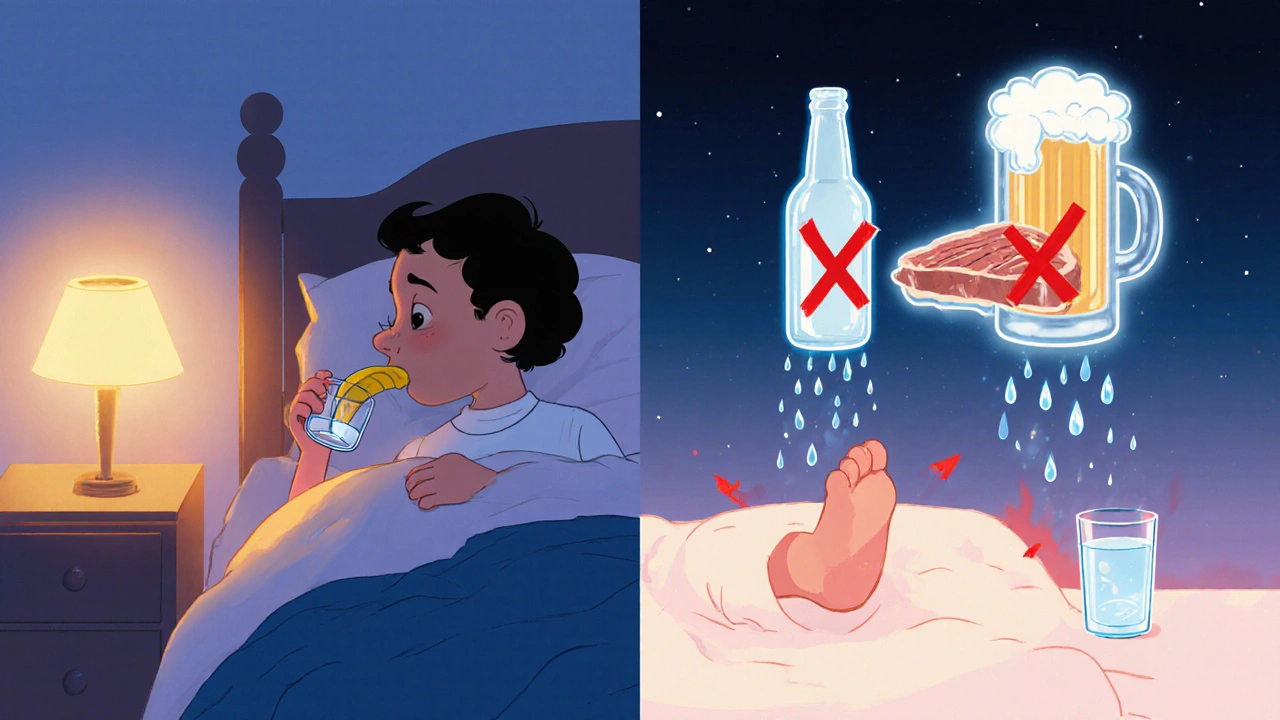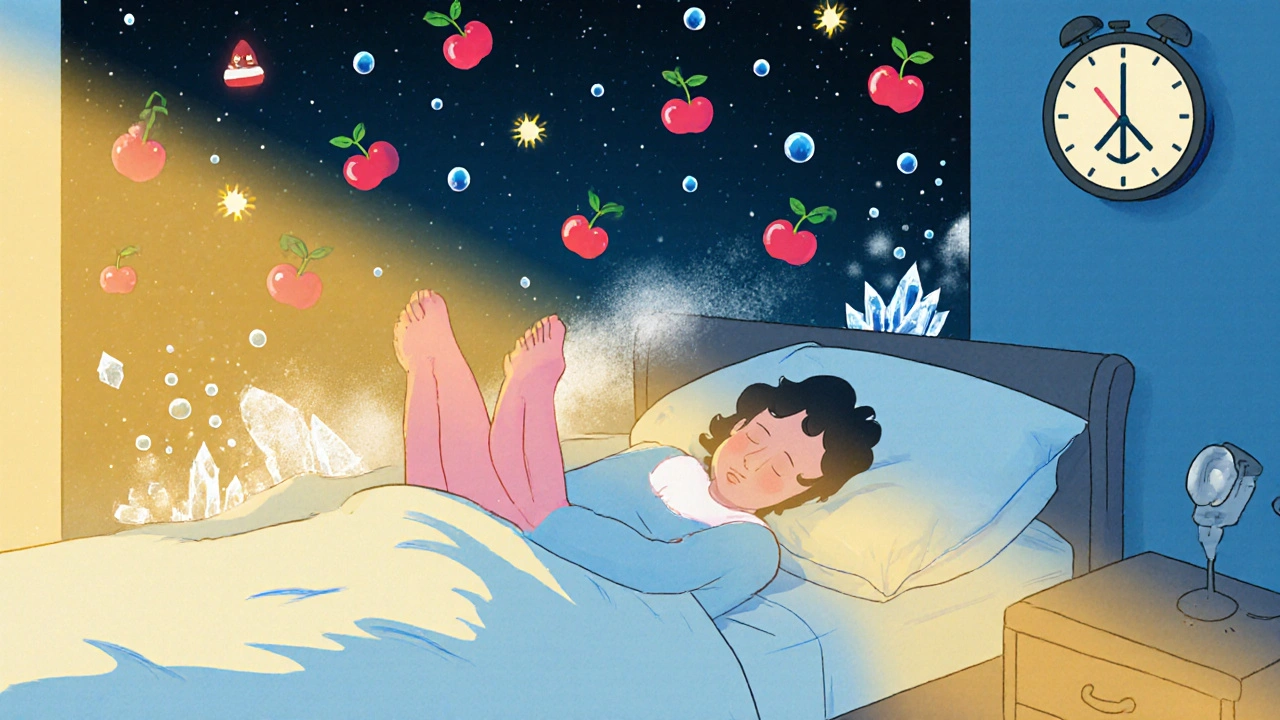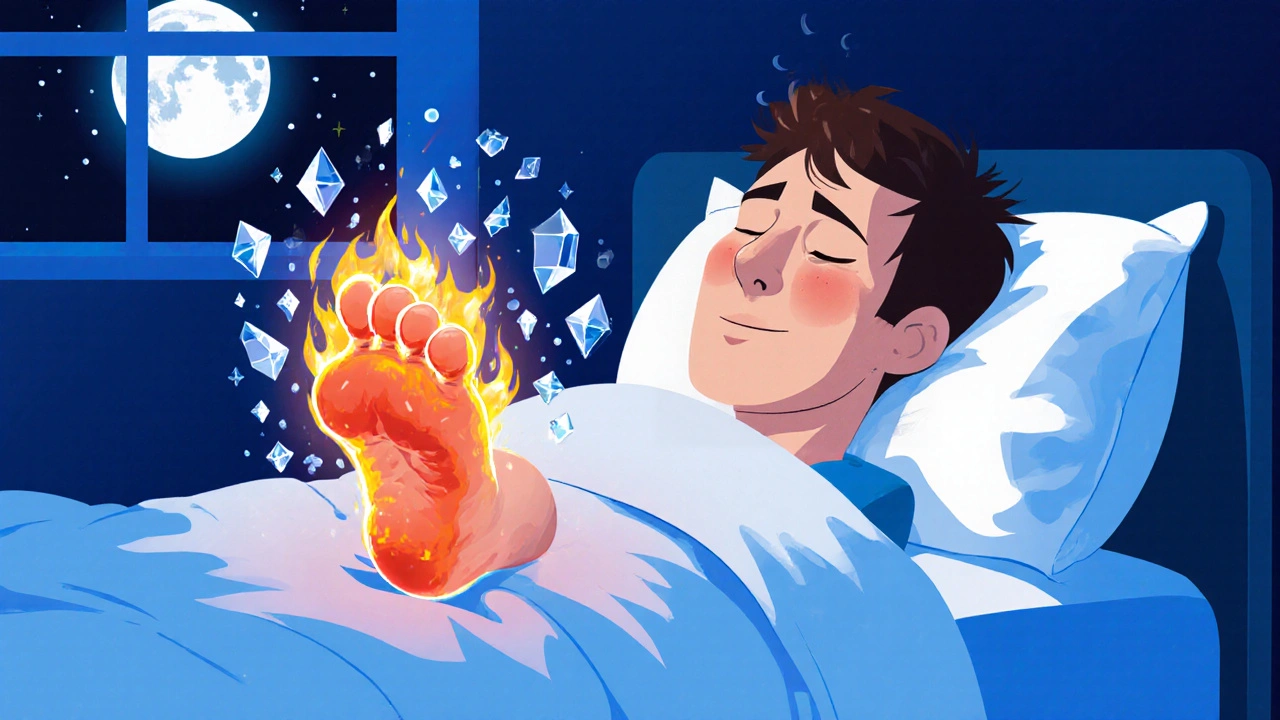If you’ve ever woken up in the middle of the night because your big toe felt like it was on fire, you already know how gout and sleep don’t mix. The pain doesn’t just come and go-it claws its way in, usually around 2 or 3 a.m., and refuses to let go. No matter how tired you are, sleep becomes impossible. And it’s not just the pain. The swelling, the heat, the tenderness-even the weight of a sheet can feel unbearable. For people with gout, poor sleep isn’t just annoying. It’s part of the disease.
Why Gout Pain Gets Worse at Night
Gout flares don’t happen randomly. They follow patterns. And nighttime is ground zero. One reason? Your body temperature drops while you sleep. Cooler temperatures make uric acid crystals-those sharp little needles that cause the pain-more likely to form and settle in your joints. Your big toe, ankle, or knee gets hit hardest because those areas are farthest from your heart and naturally cooler.Another factor is cortisol. This hormone, which helps control inflammation, dips to its lowest point in the early morning hours. That means your body’s natural defense against gout flares is weakest right when you need it most. Studies show over 70% of gout attacks occur between midnight and 8 a.m., with the peak around 4 a.m.
Dehydration also plays a role. You don’t drink water while you sleep. Your body slowly loses moisture through breathing and skin evaporation. Lower fluid levels mean uric acid becomes more concentrated in your blood, making crystals more likely to form. If you drink alcohol in the evening-even just one beer-that’s another hit to your hydration and uric acid levels.
How Poor Sleep Makes Gout Worse
It’s not just that gout ruins sleep. Poor sleep makes gout worse. When you don’t get enough rest, your body produces more stress hormones like adrenaline and cortisol. Over time, this raises inflammation levels across your system. That means more frequent flares, longer recovery times, and a higher chance of chronic joint damage.A 2023 study from the University of Birmingham tracked 1,200 people with gout over 18 months. Those who slept less than six hours a night had 40% more flares than those who slept seven or more. The link was clear: sleep deprivation didn’t just make pain feel worse-it actually triggered more attacks.
And it’s not just about quantity. Quality matters too. If you toss and turn all night, your body never reaches deep, restorative sleep. That’s the stage where your immune system resets and repairs tissue. Without it, inflammation stays high. It’s a cycle: gout keeps you up → you sleep poorly → inflammation rises → next flare hits harder.
What You Can Do to Sleep Better with Gout
You don’t have to live with sleepless nights. There are practical steps you can take right now to break the cycle.- Keep your bedroom cool-around 18°C (65°F). This helps prevent uric acid crystals from forming in your joints. Use breathable cotton sheets and avoid heavy blankets.
- Elevate the affected joint. If your toe or ankle is flaring, prop it up on a pillow. This reduces swelling and takes pressure off the joint. Even a rolled-up towel under your mattress can help.
- Avoid alcohol and heavy meals after 7 p.m. Alcohol, especially beer and spirits, spikes uric acid. A large dinner, especially one with red meat or shellfish, does the same. Try a light snack like banana or oatmeal if you’re hungry before bed.
- Hydrate well during the day. Drink at least 2.5 liters of water daily. Don’t wait until you’re thirsty. Sip steadily. One study found that people who drank more than 8 glasses of water a day had 48% fewer gout flares.
- Take your medication as prescribed. If your doctor gave you colchicine or allopurinol, take it on time. Don’t skip doses because you feel fine. These drugs work over time to lower uric acid levels and prevent flares.

Positioning Matters: Best Sleep Positions for Gout
How you lie down can make a big difference. Sleeping on your back is usually best. It keeps pressure off your feet and lets your joints stay aligned. If you sleep on your side, avoid putting direct weight on the affected joint. Use a pillow between your knees to keep hips and ankles aligned.Never sleep with your foot hanging off the bed. That puts constant tension on the tendons and can trigger pain. If your toe is swollen, wrap it lightly in a soft cloth-not tight, just enough to cushion it. Some people find relief with a gout sock designed to leave the toe exposed while supporting the foot.
When to Call Your Doctor
If you’re having gout flares more than twice a year, or if they’re lasting longer than a week, it’s time to talk to your doctor. Frequent flares mean your uric acid levels are too high. You may need a long-term treatment plan.Also, if you’re taking painkillers like ibuprofen or naproxen every night just to sleep, that’s a red flag. These drugs can damage your kidneys over time, especially if you already have gout. Your doctor can prescribe safer, targeted options like colchicine or corticosteroids for flare-ups.
Don’t ignore sleep problems as just part of having gout. They’re a sign your body is struggling. Addressing sleep isn’t a luxury-it’s part of managing the disease.

What Helps Beyond Medicine
Lifestyle changes can do more than you think. Losing even 5% of your body weight cuts gout flares by nearly half. A diet low in purines-avoiding organ meats, sardines, and sugary drinks-helps lower uric acid. Focus on vegetables, low-fat dairy, cherries, and whole grains. Some studies show eating cherries daily can reduce flare risk by up to 35%.Stress management matters too. Anxiety and tension raise inflammation. Try breathing exercises, light stretching before bed, or even guided meditation. Apps like Headspace or Calm have free sleep programs designed for chronic pain. Just 10 minutes a night can help your body relax enough to fall asleep.
And don’t underestimate the power of routine. Go to bed and wake up at the same time every day-even on weekends. Your body thrives on rhythm. A consistent schedule helps regulate your cortisol levels and reduces the chance of nighttime flares.
Real-Life Example: Sarah’s Story
Sarah, 58, from Solihull, used to wake up screaming every other night. Her big toe swelled so badly she couldn’t wear socks. She tried everything-ice packs, painkillers, sleeping with her foot out of the bed. Nothing worked long-term.Then she started tracking her sleep and diet. She noticed flares always followed beer nights or late takeaways. She cut out alcohol, drank a liter of water before bed, and started sleeping with her foot propped up. Within three weeks, her flares dropped from three times a month to once every two months. She now sleeps through the night. "It wasn’t magic," she says. "It was just paying attention."
Can gout cause insomnia?
Yes, gout can cause insomnia. The intense pain, swelling, and sensitivity in the joints-especially at night-make it hard to fall asleep or stay asleep. Many people with gout report waking up multiple times per night due to flare-ups, leading to chronic sleep deprivation. This isn’t just discomfort; it’s a direct symptom of the disease.
Why does gout hurt more at night?
Gout hurts more at night because your body temperature drops, making uric acid crystals more likely to form in your joints. Cortisol, your body’s natural anti-inflammatory hormone, also hits its lowest point in the early morning. Dehydration from not drinking water overnight and alcohol consumption earlier in the day can worsen this effect. These factors combine to trigger the most painful flares between midnight and 4 a.m.
Does sleeping with your foot elevated help gout?
Yes, elevating your foot reduces swelling and takes pressure off the inflamed joint. Keeping the affected area above heart level helps drain excess fluid and improves circulation. Use a pillow under your foot or prop your mattress slightly at the foot end. Even a small elevation-just a few inches-can make a noticeable difference in pain levels.
Can drinking water help prevent gout flares at night?
Absolutely. Drinking enough water during the day helps flush uric acid out of your system. Dehydration concentrates uric acid in your blood, increasing the risk of crystal formation. Aim for at least 2.5 liters daily, and drink a glass of water before bed. Studies show people who drink more water have nearly half the number of gout attacks.
Is it safe to take ibuprofen every night for gout pain?
No, taking ibuprofen or other NSAIDs every night is not safe long-term. These drugs can damage your kidneys and stomach lining, especially if you have gout, which already puts stress on your kidneys. Instead, talk to your doctor about targeted treatments like colchicine or low-dose corticosteroids, which are safer for regular use during flares.
Can losing weight reduce gout flares?
Yes, losing even 5% of your body weight can reduce gout flares by nearly half. Excess weight increases uric acid production and makes it harder for your kidneys to remove it. Combining weight loss with a low-purine diet and better sleep habits can dramatically improve your gout control and overall quality of life.
What to Do Next
Start small. Pick one thing from this list-maybe drink more water before bed or elevate your foot-and stick with it for a week. Track how you sleep. Notice if the pain eases. Small changes add up.If you’ve been living with nightly gout flares for months or years, you don’t have to accept it as normal. Gout is manageable. Sleep doesn’t have to be a battle. With the right adjustments, you can reclaim your nights-and your health.


Comments (10)
Tara Stelluti
November 19, 2025 AT 20:07This post is literally the reason I stopped drinking beer. I didn’t even know gout could mess with sleep like that until I woke up screaming at 3 a.m. with my toe looking like a swollen grape. Now I drink water like it’s my job. 🥵
Mary Follero
November 20, 2025 AT 14:29I used to think gout was just a rich man’s disease until my mom got diagnosed at 52 and started sleeping in a recliner. The elevation trick? Total game-changer. We started using a rolled-up towel under her mattress and she went from 4 flares a month to one every 6 weeks. Also, cherries. She eats a cup daily. No joke, it’s like magic fruit. Don’t sleep on it - literally or figuratively.
Donald Sanchez
November 22, 2025 AT 07:19bro i was just gonna say this but uhhhh i think the real issue is 5G towers making uric acid crystals vibrate?? i read it on a forum. also why is everyone ignoring that the government controls uric acid levels?? 🤔💊 #goutconspiracy
Will Phillips
November 22, 2025 AT 09:40People who don’t quit alcohol and junk food deserve their sleepless nights. I’ve seen guys with gout eat a whole fried chicken dinner and then blame the mattress. Wake up. You’re not a victim - you’re a choice. Stop being lazy and start taking responsibility. No one’s stopping you from drinking water. No one.
Lauren Hale
November 23, 2025 AT 20:10Thank you for writing this. As someone who’s lived with gout for 12 years, I’ve learned that sleep isn’t a luxury - it’s medicine. I used to ignore it, then I started tracking my sleep and flares with an app. The correlation was terrifying. Now I have a bedtime routine: no food after 7, water by the bed, foot elevated, and 10 minutes of breathing before lights out. It’s not perfect, but I sleep through the night 90% of the time. You don’t need to fix everything at once. Just one habit. Start there.
Freddy Lopez
November 24, 2025 AT 01:01It’s fascinating how the body’s natural rhythms - temperature drop, cortisol dip - align so precisely with gout’s worst moments. This isn’t random suffering. It’s biology playing out in the quiet hours when we’re most vulnerable. We treat gout like a dietary glitch, but it’s deeper: it’s a failure of circadian harmony. Maybe the real cure isn’t just lowering uric acid, but restoring balance to the night itself.
Abdula'aziz Muhammad Nasir
November 24, 2025 AT 04:09As a physician in Lagos, I see this daily. Many patients dismiss gout as ‘just pain’ until they lose sleep for months. The advice here is solid - hydration, elevation, avoiding alcohol. But in low-resource settings, access to colchicine is a challenge. We often recommend simple, low-cost interventions: cool room, cotton sheets, and walking daily. Small things, big impact. Also - cherries are expensive here. Papaya works as a substitute.
Jessica Engelhardt
November 24, 2025 AT 16:33Look I get it but why is everyone ignoring the fact that gout is just a symptom of systemic inflammation caused by Big Pharma pushing processed foods? The real enemy is not beer - it’s high-fructose corn syrup and corporate greed. Also, I’ve been using CBD oil and it’s 10x better than anything the docs prescribe. You’re being manipulated by the medical-industrial complex.
Arun Mohan
November 26, 2025 AT 14:03Interesting. But frankly, your advice is pedestrian. You mention hydration and cherries like they’re revelations. Have you read the 2018 Lancet meta-analysis on purine metabolism? Or the role of gut microbiota in urate excretion? No. You’re just regurgitating wellness blog nonsense. Real management requires genetic testing, HLA-B*58:01 screening, and personalized uric acid targets. Anything less is just placebo with a pillow.
Danielle Mazur
November 27, 2025 AT 03:19Wait - you’re telling me the government doesn’t control gout flares to keep people docile? I’ve been waking up in agony for years and now I realize… it’s the water fluoridation. It’s always been the water. They add fluoride to suppress our natural cortisol rhythm so we stay tired and don’t rebel. I checked my city’s water report - it’s spiked since 2015. Coincidence? I think not.